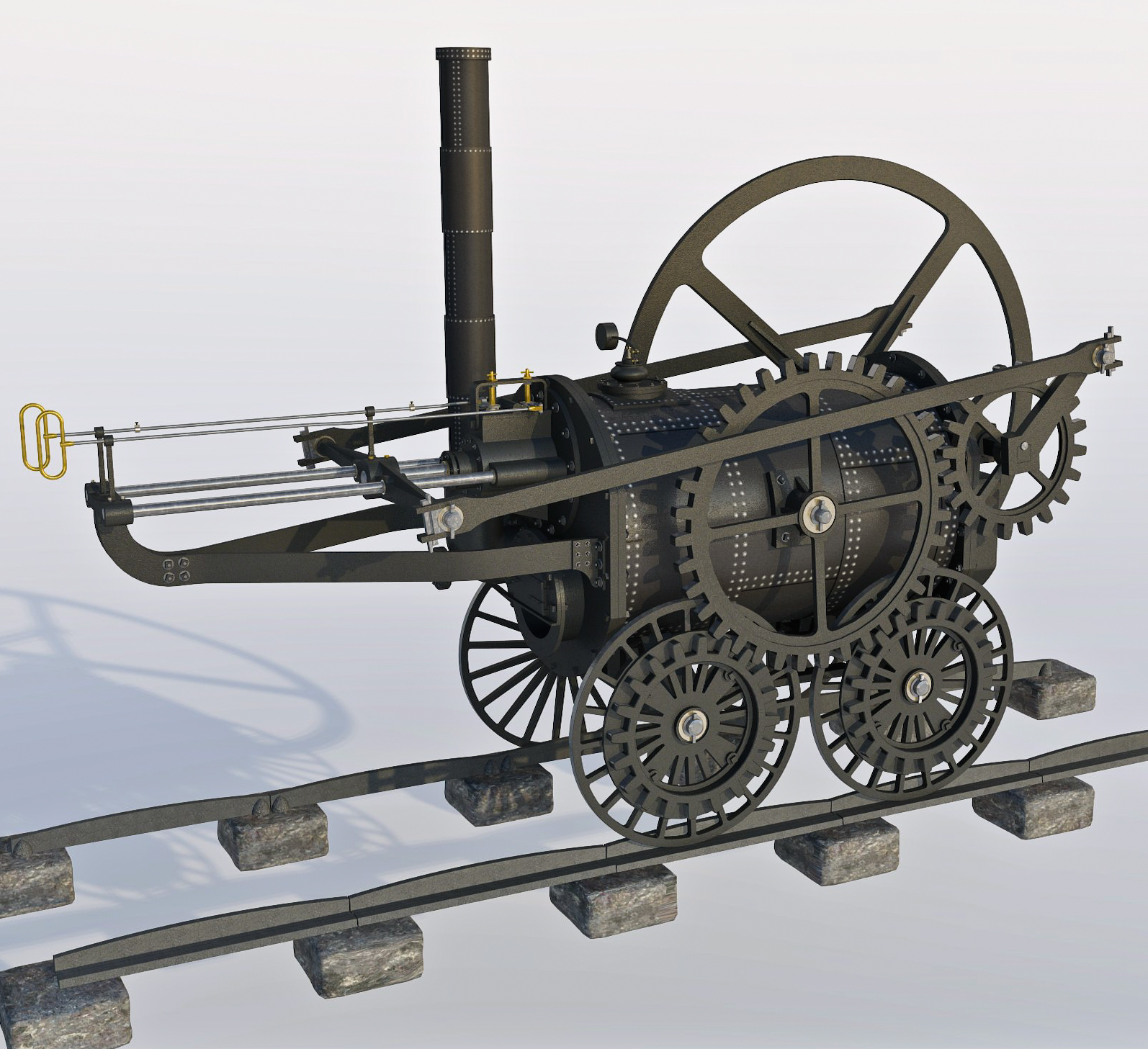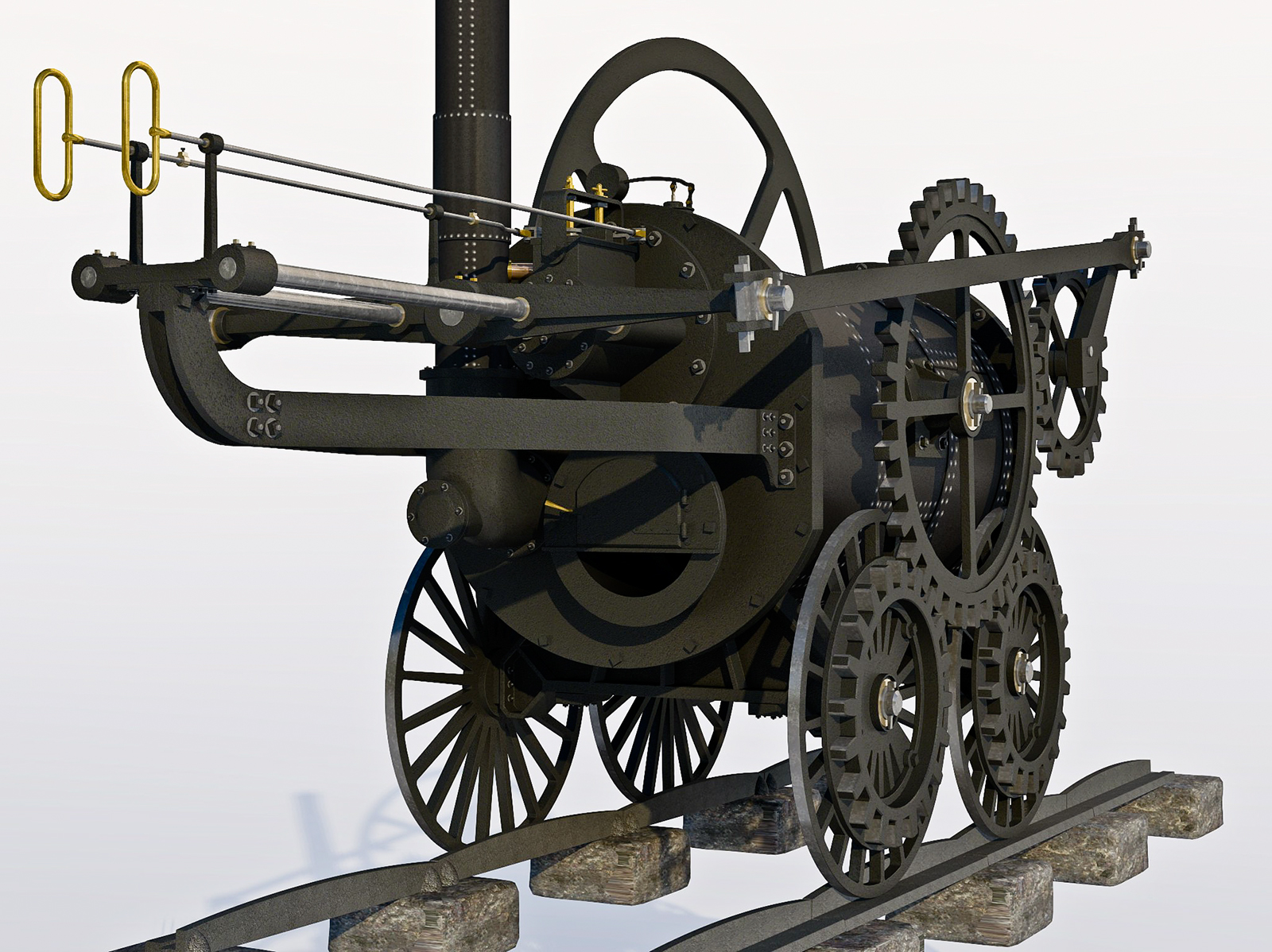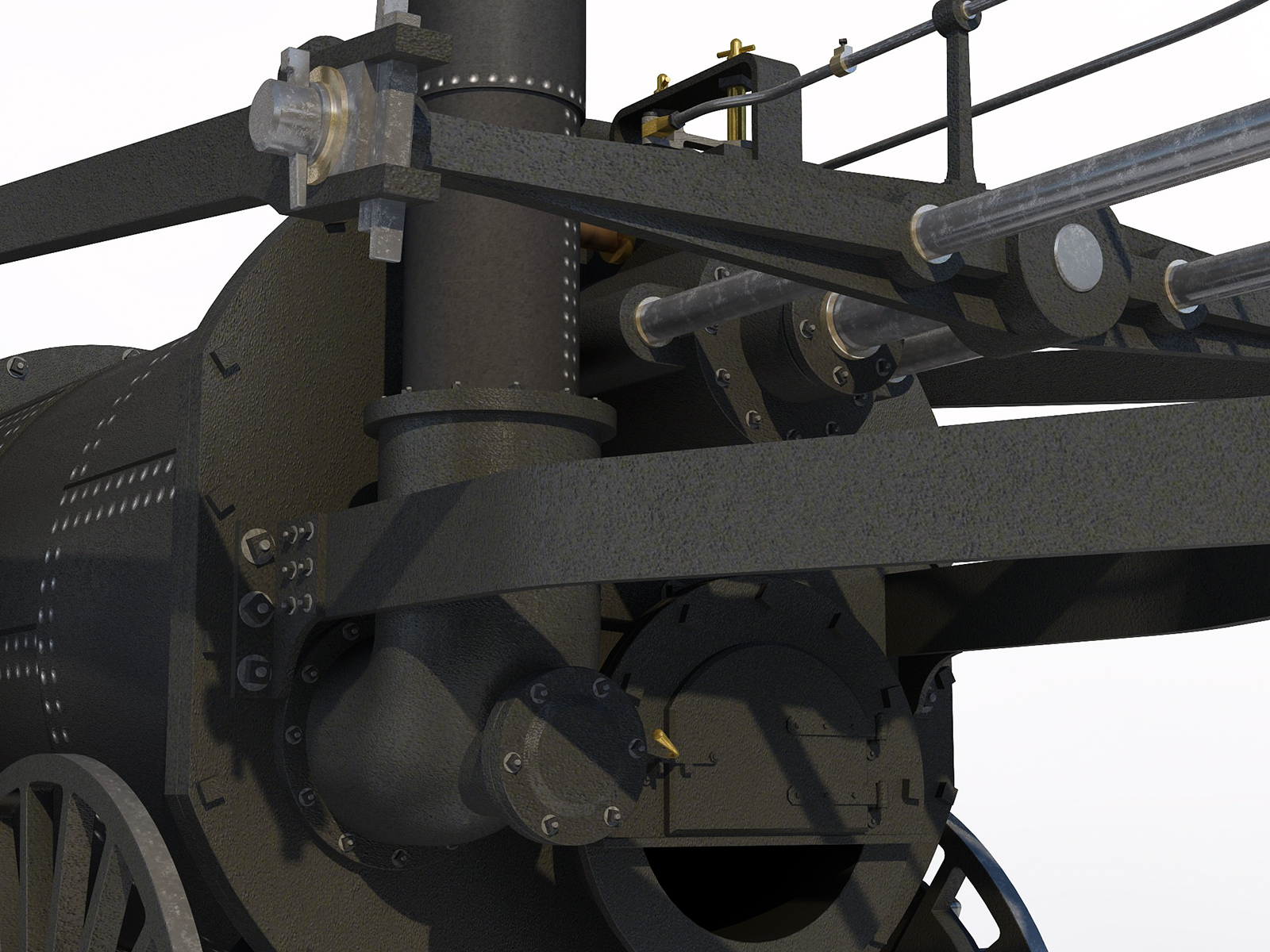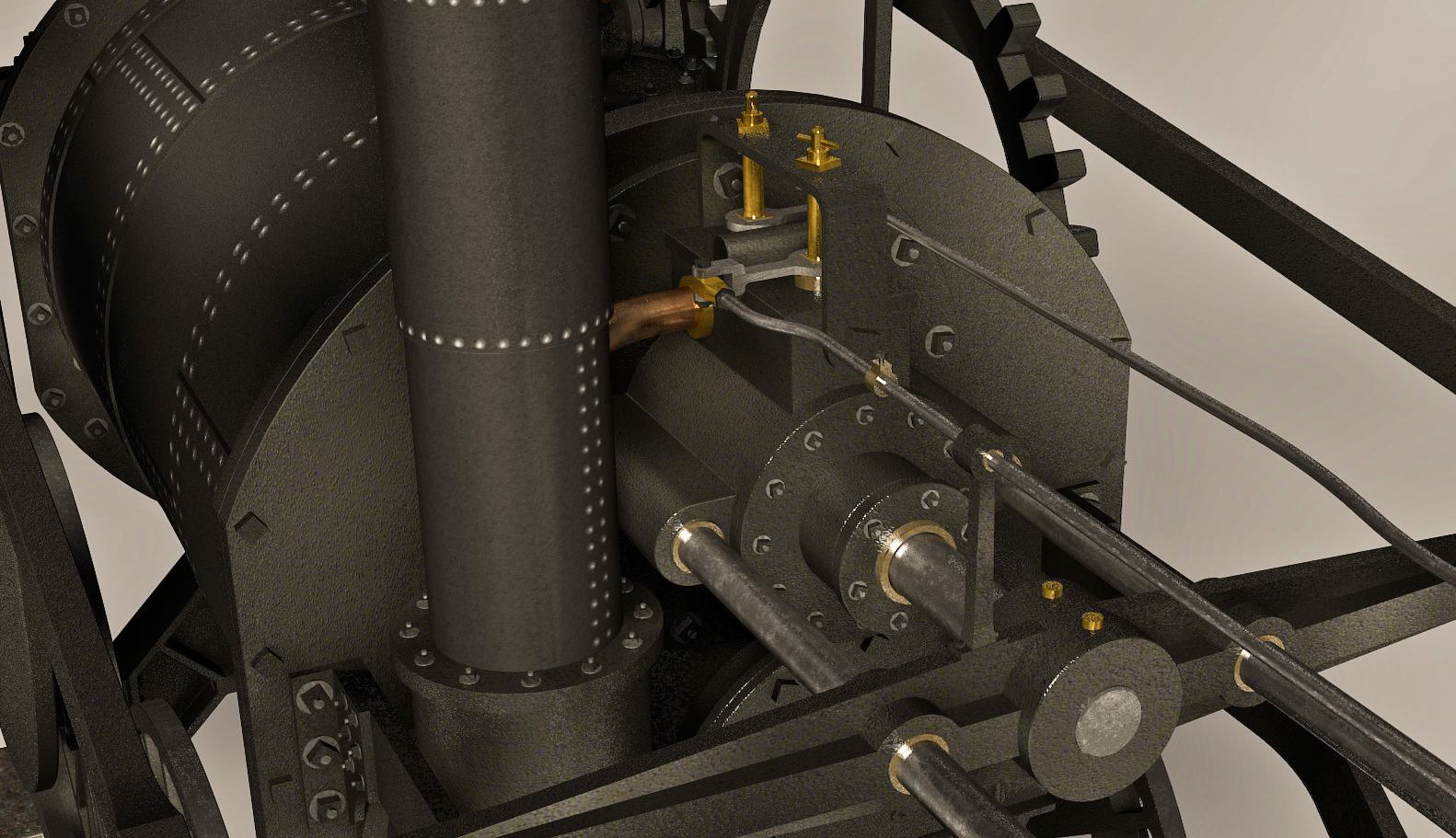Trevithick's 'Penydarren' locomotive
-
Trevithick's Penydarren loco was, perhaps, the first steam locomotive to run on rails although the cast iron rails of the time broke under the weight! There are a number of replicas of this engine in existence along with various drawings but, seemingly, no definitive drawing of what the machine actually looked like. This is my take on it!




-
congratulations

 - quite impressive - of course besides your work itself! - is the direct power transmission from the large cogwheel(?) directly to all the wheels which would be a four-wheel drive if it had rigid axles (I hope this sentence makes any sense because I could only could translate it with internet help
- quite impressive - of course besides your work itself! - is the direct power transmission from the large cogwheel(?) directly to all the wheels which would be a four-wheel drive if it had rigid axles (I hope this sentence makes any sense because I could only could translate it with internet help  )
) -
That's a very good question HornOxx! Some images/descriptions have an axle running through the bottom of the boiler barrel which I would not think possible. The full size replica has a through axle which gives the four wheel drive. For my model I used stub axles (from a plastic model instruction set) which would mean the wheels on the flywheel side will just freewheel. It was a lot of guesswork and self invention but I have got the overall look that I wanted. You are right that the large gearwheel mounted on the side of the boiler will drive the two wheels that run on the track. It itself is driven by the smaller gear which transforms the reciprocating motion of the piston into rotary motion.
This link shows a replica in action. Again, the interpretation of the original is different to my own.

penydarren locomotive - Bing
Intelligent search from Bing makes it easier to quickly find what you’re looking for and rewards you.
Bing (www.bing.com)
-
Marvelous, very nice piece of kit.
-
Thank you Mike, much appreciated!
-
Really nice work mate

-
Thanks L i am, I am experimenting with the studio type renders at present and hope to have some more views soon. Upgraded to v2.6 SU Podium which is pretty fast but so far proving very buggy and splatty although I have a suspicion that Windows 10 upgrades are adding to the grief.
-
Excellent work!
-
Thank you Bryan, glad you liked it! The bits I was most pleased with are the riveted plates - done with a texture only. The nuts and bolts are 'OnClick' components and so once placed just need a click to randomise the rotation of the nuts.
I mentioned earlier in this thread that I was having problems with SU Podium. Support at Cadalog was excellent and the issue turned out to be 'material fragmentation', no, nor me! The following link explains:
This might provide an additional route to check out when experiencing odd render behaviour in other render programs.
-
Thanks mate, very handy link/pointer we can all be helped by.
-
Beautiful work! I wonder if there's a reason why they made the rails arched back then?
-
Thank you xayzer. The rails at that time were made of cast iron. The arching was for strength I would imagine. Also, they were only meant to support the weight of wagons that could be pulled by a horse. On maps from the period they would have been shown as 'Wagonways' & 'Tramways'.
The engine that I have modelled was a lot heavier than the existing rolling stock and so was continually breaking the rails. Although the engine was successful in pulling a lot more weight it was soon relegated to the factory to serve as a stationary engine. The rail technology had some catching up to do!
-
-
Nice work. Reminds me of the one I saw at Blists Hill when I visited there. I think it was sitting on the same cast iron rails.
-
Thank you Dave. I would like to visit Blists Hill myself sometime. That area is where it all began for modern iron and steel making. I think the loco you would have seen is a replica of the one that Trevithick built after the Penydarren one. Known as the 'Coalbrookedale' I believe. He also built a road locomotive at this time. During an outing it ended up in a ditch whereupon all involved retired to a local inn. A loud explosion was heard later when the boiler burst. No-one had thought to drop the fire.

-
You're right about it being a replica of the Coalbrookedale. (A photo I took when I was there.) The sign in front of it indicated it is a working replica but it looked to me as if it would need a fair amount of work to make it working again. Still, interesting to see.
Retiring to the local inn sounds like it was a sensible thing to do but I bet they learned their lesson about walking away from a fire.

Blists Hill is fascinating especially for someone from the middle of the US. The buildings, many of which were moved into the site are in excellent condition. Not the sort of run down Victorian buildings you might see in certain areas today or maybe back in the 70s and 80s. Lots of color which is easy to miss out when looking at early photographs. You should go when they let you out again.
We went to see Iron Bridge but it was covered in plastic sheeting for restoration.
-
Arriving at a destination and finding it covered in scaffolding/plastic would be a normal experience for me! There are a number of similar sites around the UK and a virtual tour of, say, Beamish Open Air Museum and the Black Country Museum would entertain during our enforced isolation. I think we somehow get used to thinking that the world used to be in black and white. Of course Victorian buildings were once new and very much in colour. Sites such as Blists Hill reflect this but we still think it odd to view things in this way.
The above link is to original WW1 film that has been colourised and is quite startling in it's impact. The people in it could be just the same as the ones down your own street. A powerful reminder that such terrible events have no relevance to our lives today.
-
@shawb said:
A powerful reminder that such terrible events have no relevance to our lives today.
That should have read that such events are, of course, still relevant to our lives today. Excuse my poor proof reading!
Advertisement








